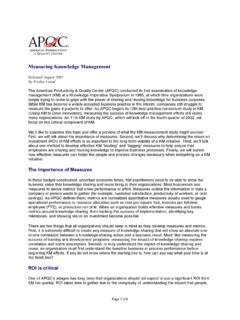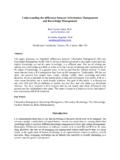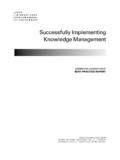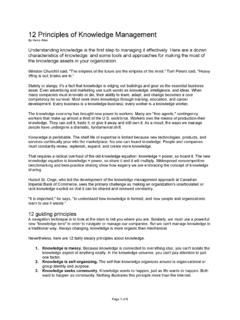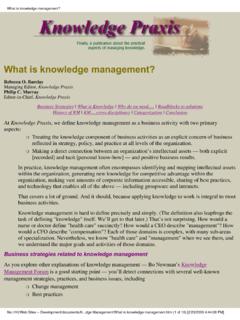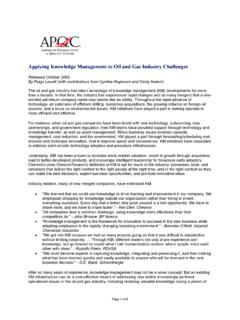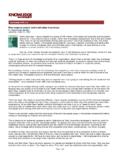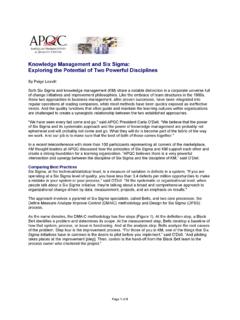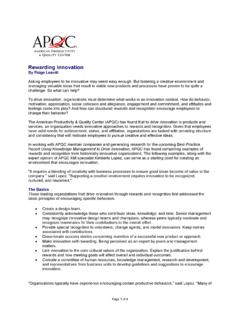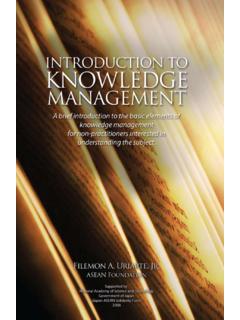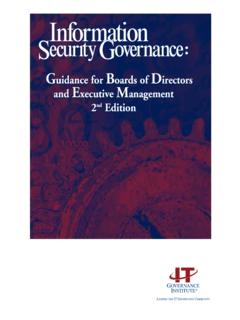Transcription of Knowledge management – An Overview - Provider's Edge
1 Knowledge management An Overview Preamble In the present day market scenario of intense competition, organizations need to know what they know and be able to leverage on it's Knowledge base to gain competitive advantage. In this Knowledge era, organisations can create and sustain competitive advantage through initiation of appropriate Knowledge management processes. The organisations that can leverage technology to exploit the data will realize the benefits by creating a competitive advantage for itself. The competitive advantage could be in the form of identifying trends, unusual patterns, and hidden relationships. The recent emphasis on Knowledge management arises out of the need for organizations to manage resources more effectively in a hyper-competitive, global economy. The need for emphasis on Knowledge management is also stressed by Nonaka and Takeuchi in their statement In an economy where the only certainty is uncertainty, the one sure source of lasting competitive advantage is Knowledge .
2 Successful companies are those that consistently create new Knowledge , disseminate it widely throughout the organization, and quickly embody it in new technologies and products'. Knowledge in Knowledge management The importance of Knowledge has been stressed by many management researchers and authors. Peter Drucker has declared that Knowledge is just not another resource like labor, capital, but is the only important resource today. Toffler subscribes to the views of Drucker, by proclaiming that Knowledge is the source of the highest-quality power and is the key to the powershift that lies ahead. Quinn shares a similar view while stating that the economic and the producing power of modern organisations lies more in its' intellectual assets and capabilities more than the other tangible assets. Nonaka and Takeuchi have focused on how Japanese companies have leveraged their Knowledge assets to gain competitive advantage and industry leadership.
3 The paradox in Knowledge management is that we are trying to manage what cannot be managed. Before we set about managing Knowledge , we need to understand what the term Knowledge refers to and the various classifications of Knowledge . Davenport has defined Knowledge as a fluid mix of framed experience, values, contextual information , and expert insight that provides a framework for evaluating and incorporating new experiences and information . It originates and is applied in the minds of the owners of Knowledge . In organizations, it often becomes embedded not only in documents or repositories, but also in organizational routines, processes, practices and norms'. Ryle, in one of his works, has explained the different categories of Knowledge . First, Knowledge is referred to what is gained through the understanding of concepts and frameworks, generally referred to as knowing why'.
4 Another classification of Knowledge , what Peter Senge termed as capacity for action', refers to an understanding of the facts and procedures required for making things happen. Knowledge also refers to the codification of factual Knowledge based on prior experience' , which is generally tacit Knowledge and is termed as knowing that'. The next usage of Knowledge refers to codification of factual Knowledge which is acquired Knowledge ' and this could be tacit or explicit. This term is also used while referring to social Knowledge of networks' indicating the persons known. This, in general terms, is referred to as knowing who'. Knowledge also refers to the cultural Knowledge facilitating communication, which in common terms is termed as Knowledge of meaning'. Why Knowledge management The field of Knowledge management has gained currency in recent times due to a wide variety of reasons.
5 Some of them are The speed of change in the market place has become so rapid that the time available for organisations to gain experience and acquire Knowledge has diminished. Organisations are required to differentiate their product or produce them in fastest possible time and the lowest possible cost. Competition in the market place has forced organisations to reduce costs. One of the methods followed is reduction in manpower. This has led to early retirements and increasing mobility of work force resulting in a loss of Knowledge Organisations are forced to compete on the basis of Knowledge Market place is increasingly competitive Reduction is staffing create a need to replace informal Knowledge with formal methods Reduction in work force due to competitive pressure Need for life-long learning is an inescapable reality Increasing dominance of Knowledge as a basis for organisational effectiveness The failure of financial models to represent the dynamics of Knowledge The failure of information technology by itself to achieve substantial benefits for organisations for organizations The diffusion of global capabilities causing developed countries to become service-based economies depending on labor from developing countries The unintended
6 Consequences of universal information access. The importance attached to this subject in management schools. The importance of Knowledge management is also corroborated by various research studies. A survey by Pricewaterhouse Coopers and World economic forum found that 95% of CEO's saw KM as an essential ingredient foe the success of their company. According to the International Data Corporation, companies worldwide are expected to dramatically increase their Knowledge management expenditure from $2 million in 1999. to $12 million in 2003. Roots of Knowledge management Learning organisation : If an organisation conforms to the required norms and can be termed as a learning organisation, then it becomes one of the start point of Knowledge management . Intellectual assets : The intellectual assets in an organisation is in the people have gained expertise through years of work experience and is tacit in nature.
7 This Knowledge has to made explicit and managed in order to leverage on it and gain competitive advantage. Knowledge based systems The systems that are evolved in an organization to facilitate the smooth functioning of the organization should facilitate harnessing the existing Knowledge in the organization. These systems could be a basis of Knowledge management . information management information is the core of Knowledge management , since information combined with experience and intuition leads to Knowledge . Hence, proper information management systems can result in an effective Knowledge management system. Innovation Creativity and innovation are methods by which new Knowledge is created. Innovation comes out of increment changes to existing products or processes and a radical change, which is different from the original process or product.
8 Radical changes give a new dimension to the existing Knowledge base and incremental changes result in changes in perceptions and line of thinking leading to new Knowledge insights. Business transformation Business transformation acts as another catalyst for Knowledge management . Organisations respond to the various changes in the market place through transformation processes like business process re-engineering. Evolution of Knowledge management Historic developments may be portrayed by the following stages of dominant economic activities and foci leading to the evolution of Knowledge management . Agrarian economics creating products for consumption and exchange Natural resource economics natural resource exploitation dominate while customer intimacy was pursued separately by expert tradesmen and guilds. Product revolution Continued focus on operational excellence and product leadership Knowledge revolution New focus on customer intimacy Hierarchy of Business Intelligence Realising the benefits from raw data goes through a number of stages as depicted in the following figure.
9 Data The basic element of information in an organisation is in the form of data. Organisations collect, summarise and analyse this data to identify patterns and trends. Most of the data thus collected is associated with the functional processes of the organisation. information Each data element is a component of a transaction and does not provide much information unless they are presented in conjunction with other data elements. The accumulation of data into a meaningful context provides information . Analytic The information gathered in the previous stage, although provides much insight, separating or regrouping this information and analysis extends the value of the information . Applications with analytical processing capabilities provide users with the ability to analyse information and determine relationships, patterns.
10 Knowledge Knowledge is different from data, information or analytics in that it can be created from any one of those layers or it can be created from existing Knowledge using logical inferences. Wisdom Wisdom is the utilization of accumulated Knowledge to create a higher level of understanding of the data. An example would help in understanding the distinction better. Mere numerals like 41, 42 are termed as data. This data, if read in the context of temperature would give an indication of the weather in that part of the world. The fact that these numbers indicate the temperature is information . Knowledge refers to the understanding that this temperature indicates summer. The decision to venture out or not in this weather, or an understanding of the effects of this weather is wisdom. Definition of KM. There are as many definitions for Knowledge management as there are people who are working on this subject.
